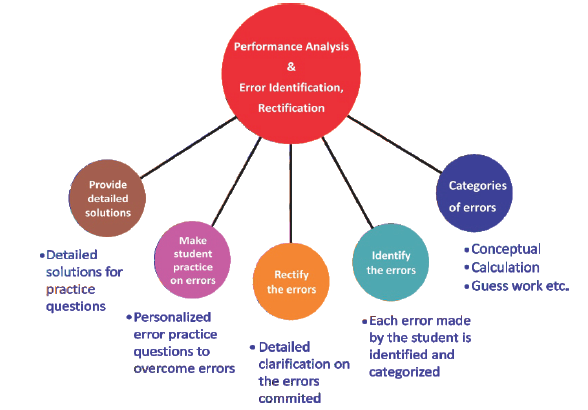Academics
Subject offered at Pre University College –
- Combination 1 (PCMB)
- Physics
- Chemistry
- Mathematics
- Biology
- English
- One of the languages among Kannada/Hindi/Sanskrit
- Combination 2 (PCMCs)
- Physics
- Chemistry
- Mathematics
- Computer Science
- English
- One of the languages among Kannada/Hindi/Sanskrit
- Combination 3 (CEBA)
- Computer Science
- Economics
- Business Studies
- Accountancy
- English
- One of the languages among Kannada/Hindi/Sanskrit
The college offers training for the following examinations:
- IIT-JEE (Joint Entrance Examination Mains and Advance)
- NEET (National Eligibility Entrance Test)
- K-CET (Karnataka – Common Entrance Test)
- KVPY ( Kishore Vignanic Protsahan Yojana)
- Foundation CA (Chartered Accountant)
- CLAT ( Common Law Admission Test)
Teaching pedagogy
Students facing some of the competitive exams are up against stiff competition. The students who attend competitive exams along with board exams are expected to excel in board exams (With languages) and also do well in competitive exams. Some of the competitive exams also consider the marks scored by a student in board exams for awarding ranks.
The challenges faced by every student who attempts competitive exams are as follows –
- a) Deep understanding of the subject (sometimes beyond the syllabus)
- b) The art of answering an entrance exam.
Competitive Exam is to;
- Practice time management
- Learn the art of taking calculated risks
- Develop creative thinking
- Develop competitive spirit
- Have concentration as and when required
- Develop leadership quality
In order to meet these challenges the college offers a unique pedagogy.
To succeed at competitive exams a student needs the following things
- Continuous Learning
- Continuous Evaluation
This must be supported by continuous counseling. The college offers one of the best pedagogy to prepare for entrance and board exams simultaneously. The syllabus for every entrance exam is the contents in both I PUC and II PUC.
The following are the features of the PUC program;
Two-track system: The child undergoes two levels of teaching each week. PUC Board lessons first, then the competitive exam lessons on the same topic. Each concept shall have multiple types of objective questions like single correct answers, multiple correct answers, integer type, assertion, reasoning, matching both sides, etc. A test at the end of each week helps in understanding the gaps in learning and teaching. Accordingly, the allocation of remedial classes for the students who are in need of additional help and excellence classes for those who can be pushed to the next level is arranged.
Lesson Plan: To facilitate this process a detailed micro-schedule (lesson plan) shall be designed which helps to know the details of the subtopic being covered on a particular day. Every week a child undergoes two types of examinations, subjective and objective.
A comprehensive schedule of chapters and their teaching is to be made available to every student at the beginning of the year. Every question in a test is linked to the sub-topics described in this schedule. It has the following effects –
- Doubt clarification is made easy.
- Identification of errors committed by the students at each subtopic level.
Performance analysis: The thirteen set of analysis that is conducted each week after an objective test helps in understanding and correcting a child’s mistakes efficiently.
Different analyses include –
Competency Analytics: How strong am I in conceptual knowledge and application? How Prepared am I to face any competitive exam?
Comparative Analytics: How am I when compared to my nationwide competition? Is my Answering pattern aligned with my goal?
Behavioral Analytics: Am I losing marks due to negative markings?
Time Management: How best am I managing my time during the exam?
Distractor Analytics: How do I uncover my error traps and get better?
Exam Strategy: How do I improve and reach my goal?


Assessment, Recording, and reporting are done as per the assessment policy. The details of the tests conducted are as follows –
- Weekly objective test (JEE/NEET/KVPY/K-CET pattern)
- Monthly subjective test
- Unit Test
- Mid-Term Examination
- Pre-final Examination
- Annual Examination (PUC)
- Language examinations consist of one paper for 100 marks.
- Mathematics examination consists of one paper for 100 marks
- Science examinations ( Physics, Chemistry, Biology, and Computer Science) consist of two papers – Theory – 70 Marks, Practical – 30 Marks
Assessment Guidelines:
Reporting method: All reports are generated and declared through the ERP of the college. The subject lecturer will maintain the marks information in their grade book.
Objective test results are announced a day after the test is conducted through ERP/SMS.
Ranking: student results are determined by performance against set standards.
Summative reports: the grade book shall be issued twice a year, once after the midterm and after the annual examination. The digital copies of all other test reports are available for downloading on ERP.
Parameters of reporting: The report will be subject-wise feedback for each student, both for the formative and summative assessments. Learning objectives for each subject may be different and individually addressed.
The report card is generated after each of these tests and sent to the parents online or offline as per the above guidelines. Report cards in case of the I PUC and II PUC annual examinations will be sent to parents as and when the PUC board makes them available to the College.

